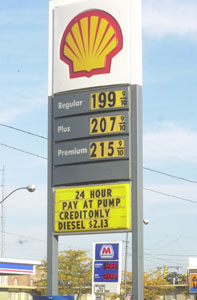By Shelley Grieshop
sgrieshop@dailystandard.com Area motorists felt the gasoline tease again this weekend as prices at the pump peaked above the $2 mark.

Much of the 5-to-8-cent increase felt in the Grand Lake St. Marys area the past few weeks is the result of destruction by Hurricane Ivan in September, at least one oil official is saying.
"This time, OK I know it's always something, but the supply is lower than the demand because of Ivan," said Terry Fleming of the Ohio Petroleum Counsel in Columbus.
Nearly 20 oil platforms were destroyed or still are in need of repair in the Gulf of Mexico due to the devastating hurricane, Fleming said.
"A lot of Midwest oil comes directly from the Gulf," he added. Price per barrel of oil this morning on the open market was approximately $52.
Fleming said oil typically derived from the Gulf area is equal to the amount the United States gets daily from Saudi Arabia. The absence of the oil is one of the big reasons for the spikes at the pump.
But why does it seem to happen regularly on the weekends?
"Gas station owners, and I'm not talking about the independent owners, many of them spike the prices on Friday, Saturday and Sunday just to discourage people from emptying their supply. They (gas station owners) make their money on the items inside, the grocery marts. If they don't have gas outside, people aren't coming inside," Fleming explained.
High gasoline demand is typically on the weekend when people get paid and travel, and that's when many stations "jack the price" to keep their supplies from running out, he added.
Fleming said the "usual suspects" in the roller coaster gasoline market are still present: turmoil in Nigeria, Iraq and Russia still causes daily disruptions in oil to the United States.
"This is a worldwide commodity. A blip anywhere in the system can affect Celina, Ohio," he said.
Fleming said propane and natural gas companies bought up supplies when prices were high, and unfortunately that will be passed on to the consumer this winter. There is an adequate supply of heating oil, he said, but many residents are waiting until winter temperatures arrive before buying in hopes that prices will drop.
"Prices won't drop anytime soon," Fleming said. "The fear is many people will want to buy at the same time. It's not that we can't produce enough in this country, it's that we don't have the storage capacity to keep it."
The 2005 Old Farmer's Almanac is predicting a tough winter with nearly half the country potentially experiencing above normal snowfall and/or colder-than-normal temperatures.
The good news is overall demand for oil is still down even though the economy appears to be moving and industry is picking up, Fleming said.
"If demand was higher at $50 per barrel, you wouldn't see spikes above $2 (per gallon). Gas prices would be staying there," he said. |

